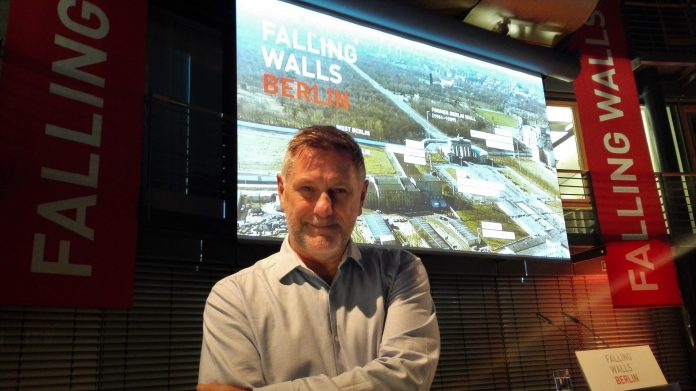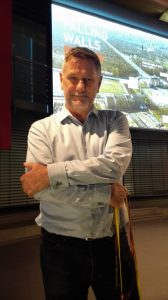
The tons of food wasted every day, the irrational use of water to manufacture jeans, and how our trash impacts climate change are some of the issues that worry and even upset Steve Evans, professor of Industrial Sustainability at Cambridge University and one of the main speakers at the Falling Walls Conference in Berlin last November.
But one of Evans’ major concerns is the current gap between science and society, which he argues is disempowering citizens.

He received his
Ciencia del Sur took the opportunity to talk with Prof. Evans in Berlin about his research and his vision for universities and interdisciplinary science.
Why is science communication important for society?
Because the current separation is disempowering citizens:
Firstly, disempowering them by making them believe that
Secondly, by reducing the excitement about science we could accidentally reduce the enthusiasm for scientific thinking, which could result in citizens not understanding how to use facts and rigor.
Falling Walls is an innovative event. Should scientists take part in opportunities like this one?
Yes. And all other opportunities.
What is your current research area?
We try to find ways to help the industry move toward a sustainable system quickly and at scale.
We are well into the 21st century, but some universities still do not want to deal with the industry or sustainability. Why?
Because teacher-leaders are older and they represent their demographic by having a similar approach to sustainability. That it is a luxury that we cannot afford because we will have to go back to the stone-age.
Dealing with industry is different —that depends on the university’s focus. As an engineer I can be a theoretical purist or I can seek more directly to have my ideas used by working with industry. The problem I am strying to solve is not a theoretical one, so I have to do my research close to practice.
What can you recommend Latin-American universities do to get involved with industries?
Accept the great challenges of our time, such as sustainability and inequality, and bring different disciplines together to offer and even build solutions.
Spend time in industries —visit them— and learn their problems. You will find many interesting research problems to solve.
How do you rate the relationship between universities and industries in the United Kingdom?
From zero to excellent.
What can we learn from the British model?
Most British industry leaders studied at university. They have that connection and it can be built again if we are willing to invest a small time on this. Everything else flows from better understanding each others’ needs.
What is the future of sustainability in the knowledge society?
Knowledge, and our creative use of it, are the main tools in our fight against unsustainability. There are many examples of this.
Lea este artículo en español.
What did you think of this article?
Director ejecutivo de Ciencia del Sur. Estudió filosofía en la Universidad Nacional de Asunción (UNA) y pasó por el programa de Jóvenes Investigadores de la UNA. Tiene diplomados en filosofía medieval y en relaciones internacionales.
Condujo los programas de radio El Laboratorio, con temática científica (Ñandutí) y ÁgoraRadio, de filosofía (Ondas Ayvu).
Fue periodista, columnista y editor de Ciencia y Tecnología en el diario ABC Color y colaboró con publicaciones internacionales. Fue presidente de la Asociación Paraguaya Racionalista, secretario del Centro de Difusión e Investigación Astronómica y encargado de cultura científica de la Universidad Iberoamericana.
Periodista de Ciencia del Año por el Consejo Nacional de Ciencia y Tecnología (2017). Tiene cinco libros publicados.














